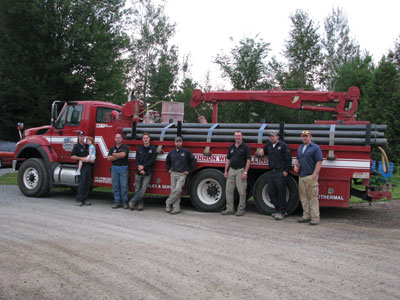
Features
Geothermal
A new avenue
Geothermal installations are a way to keep MacKinnon Well Drilling’s staff busy.
September 13, 2011 By Laura Aiken
Sometimes opportunity knocks in the form of fixing someone else’s mistake. For brothers Rob and Jamie MacKinnon of MacKinnon Well Drilling, house calls to repair geothermal units installed by others led them to enter the market themselves.
Sometimes opportunity knocks in the form of fixing someone else’s mistake. For brothers Rob and Jamie MacKinnon of MacKinnon Well Drilling, house calls to repair geothermal units installed by others led them to enter the market themselves.
 |
|
| From left to right: Jamie MacKinnon with Nadia MacKinnon, Terry Hein, Justin Montgomery, Darren Ashick, Rob MacKinnon, Phil Daber and Wade Warren. Advertisement
|
“We found that we were getting a lot of calls for geothermal units; it would be simple little things. We figured if we were going to be getting calls about fixing them, might as well be putting them in,” says Rob MacKinnon.
Jamie and Rob’s parents, Bill and Ann, started the well drilling company in 1970 in Pembroke, Ont. Pembroke, established in 1858, is about two hours north of Ottawa and a short jaunt from the Quebec border. This northern location sees them regularly boring into the rocky Canadian shield of their picturesque area. The city has a population of about 23,000 but that figure reaches 72,000 when the surrounding 40 kilometres are taken into account, states the city of Pembroke’s community profile for economic development.
The MacKinnon family has built a well-respected reputation through word of mouth. MacKinnon Well Drilling has five employees besides Bill, Jamie, Rob and their wives Erica and Leah, who handle office duties.
In 2002, Rob says they began to dabble on their own in geothermal, formally entering the market in 2005.
“We could foresee the drilling slowing down and this was another avenue too keep the guys working,” says Rob.
The kind of system, be it vertical loop or horizontal loop, depends on the area and the city. For the MacKinnons in Pembroke, they do horizontal loop, as they mostly encounter spacious one-acre lots. Their geothermal customers are residential, generally mid- to high-end homeowners, and installation jobs come by word of mouth, says Rob.
“Being a family firm, if we’re looking at a job and it’s not going to work properly, we’ll turn it down because it’s going to be our name and reputation.”
Rob says they size their geothermal jobs to do 100 per cent of the heating and cooling and that word is getting around now that it works. He says it’s of great importance to size the installation to the particular house. Successful geothermal work takes investment and education but there is an opportunity to make some money in a growing industry.
“It takes some time and it takes some money but it’s well worth it,” Rob says of entering the geothermal market. He emphasized the importance of training.
Rob and Jamie did their training at GeoSmart Energy, and they send key staff there as well. Jamie also did the Canadian GeoExchange Coalition’s installation and design course. Rob also recommends researching the area you’re going to be drilling in and ensuring you’re a licensed driller.
Sometimes repairs are a really simple matter and sometimes they require a little more head scratching. Rob recalls being called in to remove a geothermal unit from a home after one year of operation and it turned out it was only an $11 relay to repair. They bought the unit for parts as the homeowner opted to put in a wood/oil system. There are certainly sizing challenges that can happen too. With open loop systems, if the pump is too small the unit will lock out. It’s not the unit that’s the problem but rather the pump size, says Rob.
Economic conditions in Ontario for geothermal drillers recently turned more favourable with the return of the federal government’s popular ecoENERGY Retrofit-Homes program. From June 6 to March 31, 2012, homeowners can receive grants of up to $5,000 to make their homes more energy efficient. If homeowners want to install a geothermal system that conforms to the CAN/CSA-C448 Standard from the Canadian Standards Association, and a company qualified by the Canadian GeoExchange Coalition (CGC) installs the new system or a complete replacement of an existing system (new heat pump unit and new loop), the homeowner gets $4,375. The CGC must also certify the system after installation.
Rob says a lot of his potential customers have been on the fence, and the near $4,400 rebate should push some of them to the yes side. One of the challenges in selling a geothermal system is the perceived expense by the homeowner, but Rob says there is a computer program that shows the payback very quickly. While geothermal has slowed down in the recent economic downturn, the upswing and the grant bode well for future work.
Print this page